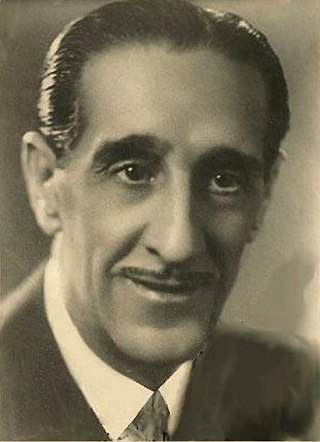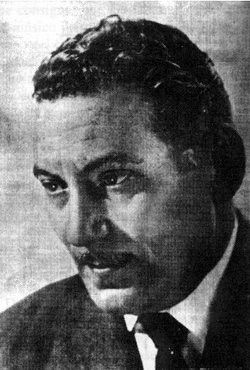Related Research Articles

Libertad Lamarque Bouza was an Argentine actress and singer, one of the icons of the Golden Age of Argentine and Mexican cinema. She achieved fame throughout Latin America, and became known as "La Novia de América". By the time she died in 2000, she had appeared in 65 films and six telenovelas, had recorded over 800 songs and had made innumerable theatrical appearances.

Miguel Zacarías Nogaim was a Mexican film director, producer, and writer.

Guillermo Battaglia was a prolific Argentine film actor of the classic era of Argentine cinema.

Benito Perojo González was a Spanish film director and film producer.

José Enrique Benito y Emeterio Ysbert Alvarruiz, also known as José Isbert and/or Pepe Isbert, was a Spanish actor.

Manolo Morán was a Spanish film actor.
Arturo Soto Rangel was a Mexican film, television, and stage actor. Soto was best known for appearing in over 250 Mexican films. He appeared in one American movie, The Treasure of the Sierra Madre, which won three Academy Awards and starred Humphrey Bogart, Walter Huston, Tim Holt, Bruce Bennett, and many other successful actors. Soto last appeared on television in 1963, where he starred in Voy de gallo.

Antonio García-Riquelme Salvador, better known as Antonio Riquelme, was a Spanish film actor. He appeared in more than 140 films between 1911 and 1967.

Fernando "Papi" Cortés was a Puerto Rican film actor, writer and director. He was born in San Juan, Puerto Rico, but he spent most of his adult life in Mexico City, where he died. On 1932, while in New York City, Fernando Cortés married Puerto Rican childhood friend María del Pilar Cordero, who adopted the stage name of Mapy Cortés. The couple soon traveled to Spain with a Cuban theatrical troupe. They worked on the Spanish stage, radio and film until the outbreak of the Civil War in 1936. Fernando progressively began to take a backseat as actor and baritone and focused on promoting the career of his wife Mapy, who became a noted vedette in Barcelona.
Carmen Sánchez was a Spanish producer, dancer, and actress. She started her career as dancer and singer of zarzuela at very young age. At age 20, she finished working on copla or chotis and was featured in films between 1927 and 1928. She was a pioneer of silent films. She became a famous Spanish actress after the Spanish Civil War.
Manuel Luna was a Spanish film actor.
Carlos Orellana Martínez was a Mexican actor, film director and screenwriter.

Malvaloca is a 1954 Spanish drama film directed by Ramón Torrado and starring Paquita Rico, Peter Damon and Antonio Riquelme. It is an adaptation of the 1912 play of the same title about a fallen woman from Málaga who eventually redeems herself.

Malvaloca is a 1942 Spanish drama film directed by Luis Marquina and starring Amparo Rivelles, Alfredo Mayo and Manuel Luna. It is an adaptation of the 1912 play of the same title about a fallen woman from Málaga who eventually redeems herself. Following the film's success Rivelles was signed up on a lucrative three-year contract by CIFESA, the biggest studio in Spain.

Alberto Amado Ribero, known professionally as Tito Ribero, was an Argentine film score composer, composer, singer, and musician. In addition to having his own orchestra, he provided the film scores to over 200 movies, at his most prolific in the 1950s and 1960s. For Del otro lado del puente he won the Silver Condor Award for Best Original Score from the Argentine Academy of Cinematography Arts and Sciences in 1953.
Julio Villarreal was a Spanish actor who later settled and worked in Mexico. He also directed two films in the early 1930s.

Don Juan is a 1956 historical comedy film directed by John Berry and starring Fernandel, Carmen Sevilla and Roland Armontel. It was a co-production between France, Italy and Spain, based on the legend of Don Juan. The film's sets were designed by the art directors Sigfrido Burmann and Georges Wakhévitch.
Manuel Fontanals (1893–1972) was a Catalonian Spanish-born art director who settled and worked in Mexico during the Golden Age of Mexican cinema.
Pepita Orduna was a Spanish film editor active in the 1940s and 1950s who worked with filmmakers like Luis G. Berlanga and Antonio del Amo.

Juana la Loca... de vez en cuando is a 1983 Spanish comedy film directed by José Ramón Larraz, written by Juan José Alonso Millán, scored by Teddy Bautista, and starring Lola Flores, Beatriz Elorrieta, Manolo Gómez Bur. It parodies the life of Joanna of Castile, Queen of Spain.
References
- ↑ Alan Gevinson (1997). American Film Institute catalog. University of California Press. p. 318. ISBN 0-520-20964-8.
- ↑ H.T.S. (July 3, 1933). "Esperame (1931): Musical Romance in Spanish" . Retrieved November 4, 2011.
- ↑ Luis Gasca (1998). Un siglo de cine español (Spanish) . Planeta. ISBN 84-08-02309-8.
- ↑ Margaret Herrick Library, Academy of Motion Picture Arts and Sciences